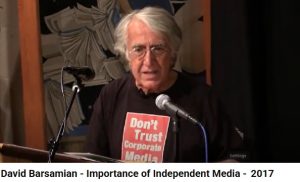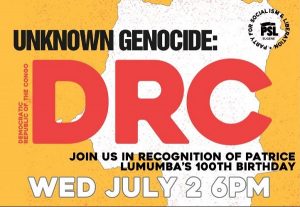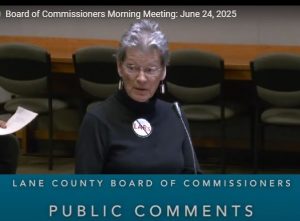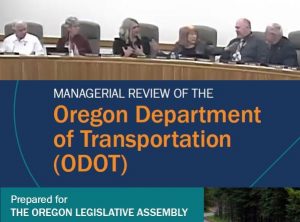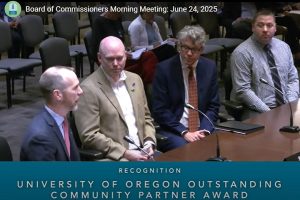Youth Radio Project interviews BIPOC heroes: Alex Reyna
23 min read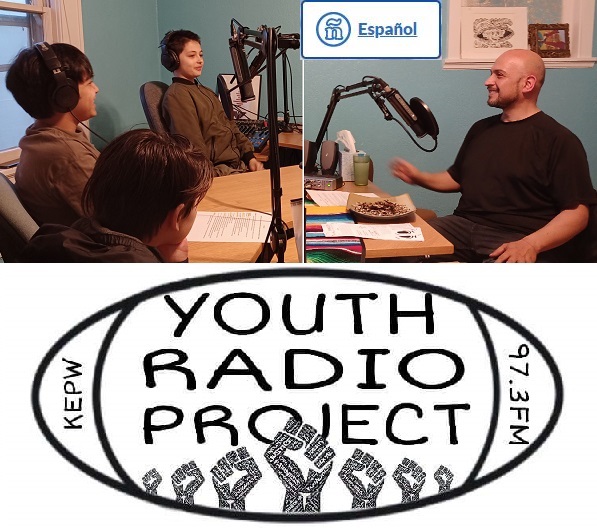
Ezekiel: Hi, my name is Ezekiel, and this is KEPW Youth Radio. We’re here with my co-hosts Beatriz, Otto, Vihaan, Ronav, Kenzie, and Wil.
[00:00:14] Vihaan: To begin with, can you tell us a little about yourself and your involvement in radio?
[00:00:18] Alex Reyna: I come from a family of musicians and music’s always been, like, my thing. Even though I don’t play any instruments, I play music, you know, in a CD player or MP3 player or mixing software, but I don’t play play an instrument.
[00:00:32] So I grew up in Mexico around musicians. Every single person in my family has been a musician or a singer, and I’ve always played with the idea of doing something. And the closest to that was getting into radio.
[00:00:46] I got in radio several years ago with the first Spanish radio station here in Eugene, and I started there as a salesperson. I wasn’t anywhere near a microphone. I was going out there to the community and offering commercials for money, and that’s how I make my living. I was very successful doing that. There was something that always called me and what it was is participating in all the marketing aspects of radio sales.
[00:01:15] And so back in those days the company that I worked for was separated into two big departments. One of ’em was like, where the sales happen and Human Resources and all the office stuff. But on the other side it was like all the fun part. It was the microphones, the guests, the music, the DJs, all the events out in the community, and both of ’em called me. I wanted to be a part of that, but I also wanted to be a part of that.
[00:01:38] So what I started doing is, in my sales pitch, when I would sell radio to people, I would offer things like, ‘Hey, how about the radio DJs come here, and then do this whole celebration, and we’ll do (what it used to be called) a remote?
[00:01:52] And as I started doing that more and more and more, I used to hang out more with the DJs now than I did with the people in the office. And then later on it’s like, ‘Hey, you know what? Why don’t you write your own scripts for the commercials? So, for your clients?’ I’m like, ‘Okay, well, I can do that.’ So I started writing commercials.
[00:02:07] I started doing the voiceover for the commercials, and then they, sometimes they’ll, like, pull me from the hallways and be like, ‘Hey, hey, we need somebody here to just sit there and just, be cool with it.’ And they’ll be having an interview and they’ll have me there just to laugh so that the whole show will have laughs in the background.
[00:02:24] Or they would just ask me a question and before I will talk, they will interrupt me and just, like, laugh. They will just kind of mock me a little bit, but they were just trying to get me comfortable behind the microphone. Before you know it, I started doing different things but never thought, ‘Oh, I’m going to be a radio DJ or a radio personality.’
[00:02:40] Not until years later. The company had to close. Unfortunately both of the owners passed away and there was nobody, really, that wanted to take on a Spanish radio station. And so the radio station went away and it was missing in our community for about eight years. That to me was a problem because I felt that the Spanish-speaking community here locally was being underserved. And I decided to go wander out in the radio world and I thought, ‘Well, maybe I can start a radio station.’
[00:03:08] And so I called all my ex-colleagues from that radio station and we didn’t have the money to do a radio station. So we thought, ‘Well, why don’t we just do it online?’ Technology was available. It was fairly new. I don’t think anybody was doing much of broadcasting online. But I decided, ‘Okay, you know, what the heck, let’s just do it.’
[00:03:27] And I started recording, I started creating radio programming just like a regular radio, but online, which is also unheard of. It’s two totally different concepts, but I decided, ‘hey, I’m going to do it anyway.’
[00:03:40] And then I decided I was going to open my own studio and I was going to have people in the community show up and start doing their own shows, which I thought was pretty cool.
[00:03:50] During that time there was a lot of information out there that wasn’t getting to the Spanish-speaking community. Like, we didn’t know people in the community that spoke Spanish, that offered some kind of service. We didn’t know, ‘Oh, there’s a dentist that speaks Spanish, that she is from Puerto Rico.’ ‘Oh, you can sign up for services for Lane County WIC.’ ‘Oh, you can do this. You can—’ there was none of that stuff.
[00:04:10] And so that’s what I was inspired to do and just create a radio station that would offer this information to the local Spanish-speaking community.
[00:04:22] After that, then things just kind of took off and I got involved in different projects. I got involved with KEPW in its beginning stages when before there was even a signal, before they even had the license, they were just doing the same thing I was doing with La E-Kiss, they were doing that with KEPW. Like, ‘Okay, so how do we go on the air if we don’t have the tower yet? If we don’t have the license yet?’
[00:04:45] Like, ‘Well, you can do it online,’ and I was going to share some of my expertise. And I was involved in that beginning stage of KEPW. That’s something that kind of helped me also want to be in this trade.
[00:04:58] And with time I’ve been—I turned what used to be a for-profit model of radio station to more of a nonprofit, meaning that whatever work that I was doing, it was more for the community rather than to generate income for a company. And before you know it, it just took off and I started creating relationships with government entities and with nonprofit organizations and people in the community.
[00:05:28] And today I sit in a whole different place looking back, going like, ‘Man, it’s so nice that we are able to bring something to the Spanish-speaking community that didn’t exist before, and that other people are getting inspired,’ such as you guys are inspired to do this kind of work, and hopefully we can continue to do this work for a lot of people.
[00:05:45] But when people ask me a lot about me, I have a hard time being very specific about something because it’s been eight years of work that, it’s never been what I anticipated. It’s always changed. And this is a good example of it. I’m being interviewed in the very room where I used to do my shows by a group of kids who appeared in my vision of what I wanted to do for our youth and you guys are doing it.
[00:06:11] This is so very dear to me. So I’m very glad you guys started doing this and that we’re having this interview right now.
[00:06:17] Ezekiel: What is La E-Kiss and how did it get started?
[00:06:22] Alex Reyna: La E-Kiss. La E-Kiss is a dream come true from someone who would never dream of something like that. And what I mean by that is, it all started several years ago with the idea of creating something that would feed my family. And there would also be some service into the Spanish-speaking community. And I guess the best way to describe it is, it was something that I could do that would provide a service that was feed my family, but at the same time, it would be fun.
[00:07:00] La E-Kiss just took off on its own. I never really had control of it because the difference between a for-profit radio station or a radio station that lives off radio marketing and commercials and revenue comes in that way. the content is dictated by that and La E-Kiss, it’s never been that it’s been controlled and its destiny has been dictated by the audience, by the people, by the community. It still has the same kind of model as a conventional radio station or online radio station now are a little different, but La E-Kiss has become a brand that provides a service to those who ask for it.
[00:07:41] And in this particular case, the Spanish-speaking community has created or molded what La E-Kiss is today. And it all started as a streaming radio station online, and then it went on to be a social media / streaming, and then it became social media / streaming and FM for a little bit too.
[00:08:07] And then eventually it came down to, ‘Let’s just focus, La E-Kiss is going to focus to providing language access to the Spanish-speaking community, to things that normally are not there.’ La E-Kiss is partnered with the City of Eugene for some projects that allow that to happen.
[00:08:28] La E-Kiss is now, it’s something that the community owns because it changes constantly based on the need of the community, whatever it is right now. La E-Kiss for a while was doing public service announcements on Facebook that looked like a news show and then eventually that transitioned over to the city.
[00:08:49] And so now what La E-Kiss is doing is becoming a platform for others to promote what they’re doing and for the community to amplify messages out in the community. So we have a page designated for La E-Kiss. And then we have one for Friends of La E-Kiss and we have one that is my personal one as a public figure.
[00:09:12] But all this pages are connected to other community partners and we amplify messages that benefit our community in some way or another. So La E-Kiss is right now it’s, I would say, it’s more of a brand, that it’s a conduit of information that is needed to reach the Spanish-speaking community and for the Spanish-speaking community to be able to send their message out and amplify that.
[00:09:34] Ezekiel: How did you learn to manage audio technology and running a station?
[00:09:41] Alex Reyna: That’s a really good question. I learned as I went, I learned by mistakes, I learned by looking up to other individuals who were doing that similar work and not being afraid of just asking. I remember always having this fear of when you’re in this type of business or this type of trade, everything seems to be like some kind of competition.
[00:10:03] Like, ‘Oh, you are this DJ and you have all these ratings,’ and then somebody else that does the same work and has got more ratings than you, so now you’ve got to put it. And for me it was like I was really shy to just reach out to people. But eventually I started like reaching out to people who were in the trade for a long time and just honestly just tell ’em, ‘Hey, look, I am working on this project. I’m having some difficulties just getting myself started with my own show. I’ve never done a show. I’m not a DJ. I’ve just seen it. I just heard it, and I want to do something.’
[00:10:33] And you’ll be surprised how people volunteer that information and more. So I got a lot of it from some really good individuals here in our communities, people from all over the world.
[00:10:44] ‘Cause when I started doing this, it was through Facebook and through streaming. So people could just pick up the signal or the streaming anywhere. And I started getting people to reach out for me from all over the world and they would share some of their knowledge.
[00:10:58] And I started putting this knowledge and that knowledge and that new knowledge all together and just trying things out. And I discovered that everything was not as difficult as it seemed at first, and then just with practice and with passion, little by little, I started becoming better and better at what I was doing.
[00:11:15] Ezekiel: ¿Cuál es uno de tus recuerdos favoritos escuchando la radio?
[00:11:20] Alex Reyna: Ahh, honestly I don’t listen to radio as much as I used to, because there’s so much stuff out there available to me. But I remember one of the things that I really liked about radio was listening to a radio show from one of my really dear friends. His name is Nelson Zepeda. He used to have this show where people would call in and just complain about stuff.
[00:11:41] And he had his little sidekick, he called him Morrillo, which was this little kid who wasn’t necessarily the most well-behaved kid. And so every time Nelson would read off one of the complaints from people, El Morrillo would make a joke about it or, make fun of another person or the other person or the situation.
[00:11:58] And it was just like really good dynamic between the two. And the funniest thing is that there was no such thing as two people. It was him with another microphone and he would just change his voice. So he was actually talking to himself. I knew that. Most people didn’t know about it. As a matter of fact, a lot of people thought I was El Morrillo just because I would hang out with Nelson all the time, but I liked how the community engaged so much.
[00:12:21] Radio back in those days, people were so passionate about it, so into it. They wanted to know who the DJs were and they were always calling in to do song requests and they wanted to meet the DJs. It was a whole different culture than it is nowadays.
[00:12:35] But what I loved about it the most is that there was always that interaction between a person behind a microphone that nobody knew that would put out some content that would make people come together. And you could see that at events and you could see that with the sponsors, you would see people in those places because they heard it on the radio.
[00:12:54] So that’s one of the things that I liked the most about radio, and one of the reasons why I got into radio in the first place.
[00:12:59] Ezekiel: How did you become interested in radio?
[00:13:02] Alex Reyna: At first it was, you know, what everybody else says who wants to start a business. I knew how everything worked: the financial aspects of it, the permits, the licenses needed. I knew the sales component of it. Then I learned the programming and then even further down, I started recording commercials and using my voice for it. As a matter of fact, here locally, I used to be the voice of Dari Mart, the voice of SELCO, the voice of Coastal Farm & Ranch, all in Spanish.
[00:13:32] And then the more and more I thought about it, I’m like, ‘Well, I know all the components and I’ve done the work, just not for myself. I’ve always done it for someone else.’ That’s what kind of got me going. Later on, things changed, but at the beginning it was, ‘Okay, I can start my own radio station. I can make a business out of this and utilize all these knowledge,’ that to me at the time it was really fun and I thought it was easy to do. So that’s what got me started.
[00:13:57] Ezekiel: Who are some journalists that you admire?
[00:14:00] Alex Reyna: Well, I would say that I’m not a big fan of journalists nowadays. I think that that has changed quite a bit. It used to be different, when I moved here, one of the things that would catch my eye was like the local news, the 11 o’clock news.
[00:14:15] I, I never really understood the dynamic of news or why they would come up at a certain time. And the more and more I lived in this country and then this community, I realized, ‘Oh, there is a purpose for what time the news come out.’ You know, there’s like the morning drive, the afternoon drive, the night news, and there was some specific people, the one that just comes to mind, as a matter of fact, I still have her as friends on Facebook. Her name was Brandi Smith. And she’s someone who I always thought that was very transparent and she was always, like, down-to-earth. I do know some people that she interviewed and people always felt very comfortable opening up to her.
[00:14:51] She was more like the down-to-earth real journalism non-biased type of journalist. Even from the really famous ones, the ones on national television, I am more of a local person and I want to say Brandi Smith is one of the people who also inspired me to be that type of interviewer myself.
[00:15:09] Ezekiel: ¿Cuáles son los programas de la radio en Español que nos recomiendas?
[00:15:16] Alex Reyna: Mira, ahorita, totalmente, radio en Español, no tengo conocimiento. Right now, I’m not very familiar with what’s going on in Spanish radio. I have focused on a different journey in my life to where local radio is not something that I listen to anymore. What I’d recommend is, when it comes to radio and Spanish radio, there are so many different options. But there are not as many options for just your conventional radio, right? Your English spoken radio.
[00:15:48] So what I always tell people when they ask me about Hey, do you like this show? Or what shows would you recommend? Because I come from radio, people think that I am very versed on what’s going on right now and I’m really not.
[00:16:00] But what I would say is look for the type of content that gives you happiness on that day. I think radio is the opportunity for you to get out of your routine and venture out into a whole different world, almost like reading a book where you can imagine everything that’s being said come to reality. And if that looks in the form of talk format there are several talk shows out there in radio.
[00:16:27] There are some that come out of Portland. There are some colleagues up there, all my ex-colleagues that have radio content. But nowadays you can stream everything.
[00:16:35] Also if your format is music, it’s difficult to find different formats here. Like for instance, here locally, you can find original Mexican music and a little bit of other genres, but you can always look for the performance, like salsa music, reggaeton, you can look for just as a matter of fact, you can listen to radio stations that come from Mexico, from Colombia, from Ecuador, from Venezuela. You can just download an app on your phone and start listening to that.
[00:17:03] I think radio nowadays has changed so much to where we all, we just used to listen to radio, just because it was the only thing available. There are so many things available out there now. So I recommend that now that people just find what it really helps ’em get through the day in a more positive attitude.
[00:17:19] Ezekiel: ¿Qué papel tiene la radio para la comunidad hispanohablante y la comunidad inmigrante?
[00:17:27] Alex Reyna: Oh, radio is a huge contributor to that. When we talk about being able to deliver a message or receive a message, one of the biggest challenge in the immigrant community is that out of fear, we don’t want to put our face out there. Out of fear, we don’t want to participate in things. We stay quiet, we stay behind the scenes. We hide and radio provides that channel of communication. All those unheard voices can be gathered in one place and then thrown out there in the world for everybody to know.
[00:18:01] And I think radio, in any language, in any format when it takes on taking people’s voices and amplifying that, and then this, dispersing that all over a community, or depending on, right, the reach.
[00:18:14] But radio is a really good tool to be able to do what nowadays is kind of dangerous to do, like going out there and doing protests has become really dangerous, as other things like that where you have to expose your presence, it puts yourself in danger. Radio has a lot of power to reach a lot of people and it has a lot of power to take someone’s voice and then deliver it to someone else, it can actually make a difference.
[00:18:40] So, to me, I think radio’s kind of lost its way a little bit because it’s become too commercialized. You have a radio (station) ’cause you want to make money. You have radio that works for the advertiser, it works for the corporation that is dictating what you can and can’t play.
[00:18:57] It’s dictating what type of contact you’re gonna have, but when you have community radios like this one, I think that it’s a great opportunity to utilize it as a tool for people, for the immigrant community in particular, for them to have this voice. Even if it’s just one person or it’s 1,000 people, to provide that outlet of information or reciprocal information, I think it is one of the most important things that, oh, we don’t really take a look at it.
[00:19:23] We don’t pay much attention because we are blinded by technology nowadays. We have the newest phone, with the apps and I can listen to whatever music I want and I can do all this other stuff. But this, radio in particular, I think it’s a good tool to use. And I certainly hope there are people out there who want to start looking into that and making it more of a tool for the community than just making money.
[00:19:46] Ezekiel: ¿Hay música en La E-Kiss?
[00:19:49] Alex Reyna: La E-Kiss, it’s morphed from what it used to be at 24/7 music to be in a very, very specific and targeted-type format. As a matter of fact, it’s gone from the radio station model to the multimedia model, which what that means is, if people are asking for music, we’ll come up with music and we will deliver music through local artists or through artists that are not well-known.
[00:20:19] They have some really good music and some really good content. So currently we have people from different communities recently from Portland who just came out with an album and they want that to be out there and to be known and to be heard, rather than to play it on the list every so often.
[00:20:36] We’ll just take that song, and then we will create a little tiny kind of marketing campaign around it so that we can introduce who the singer is, who the writer of the song was. And then we publicize the song for people who follow to listen, to share. And then we let it take off on its own.
[00:20:54] La E-Kiss’s main focus right now is community and it’s creating that connection between community and government. One of the things that we learned as La E-Kiss is that we had a lot of power of communicating. We had the ability to have the support and participation of our Spanish-speaking community. We worked really hard to earn their trust. And then the same goes for nonprofit organizations.
[00:21:17] But there was a component that was missing and that was government, that was decision-makers, that was people that can make those kind of changes. And so now what La E-Kiss is trying to do is just be that glue in between all of ’em so that, so the government, when they want to reach the Spanish-speaking community, the government can rely on nonprofit organizations to deliver that for them.
[00:21:39] So when the Spanish-speaking community has a need, the nonprofit organization can have that communication with government. Or even better, that the Spanish-speaking community feels comfortable talking to government.
[00:21:50] And then the government understands what the Spanish community here locally looks like, who they are, what things scare them, what things motivate them, what things they need, what are the needs. Right now, La E-Kiss, it’s more of a multimedia brand that focuses on the needs of the community.
[00:22:12] Ezekiel: ¿Hay noticias en La E-Kiss?
[00:22:13] Alex Reyna: Yes and no. There are news. They come out every Monday at six o’clock through La E-Kiss. It used to be produced and it used to be born in La E-Kiss and there was some changes in the last eight months. We decided to create the same news content and everything, but now it’s actually produced by the City of Eugene.
[00:22:37] I happen to be the person who does the production and does the news recorded at the city, but we still use La E-Kiss as the channel of spreading the word out. So because the power, La E-Kiss of partnership with others, La E-Kiss used to rely solely on itself, on its followers and with time now we rely on all of our partnerships and that is people in the community, that is nonprofit organizations have their own page, even government, the city of Eugene has a Spanish landing page where all those news come out. So no matter on which page you land, whether it’s the EPD or it is Planning & Development or Public Works or whatever page you land, if you click on a logo that’s, that has Ñ for Español, it will take you to the Spanish landing page and then you will be able to see those news. But they’re all, they’re rooted from, La E-Kiss is the one that distributes it.
[00:23:36] Ezekiel: How do you get your stories and information?
[00:23:39] Alex Reyna: Oh, that’s a pretty cool question and a very good question. So there’s a team of people, we’ve been working on this project and there’s some people that have left and some people that have joined our team, but there’s a team of four people from different walks of life.
[00:23:53] In the past, it used to be pretty even because two of ’em were city employees, City of Eugene employees, two of ’em were just us in the community. I’ve recently accepted a job to work for the City of Eugene. So I, now I’m part of that. And so it’s a little unbalanced.
[00:24:09] So we’re always trying to find people that can bring that balance to the team. But essentially what we do is we connect with nonprofit organizations and city departments to see what things are going out to the general public that are important that the Spanish-speaking community is not getting.
[00:24:29] So a good example of that will be every time there is a change of an ordinance or a law, or there’s a new mandate for something or there’s a health threat. Or, now with the weather conditions, they get bad and the roads get icy or when the fires happen and all that stuff, like there was, there’s news all over the place to send that information to English speakers, but almost none to a Spanish speaker.
[00:24:54] So that’s how we come up with the news, is, we look at what’s out there that is like top news that people really need to know in order to stay safe and avoid incidents or accidents. And also resources and things that are out there for fun for the community.
[00:25:12] It’s very difficult to live in a different community than the one you were born. And not know what’s going on. You want to go out and have fun just like everybody else. You want to go out there and be a part of something, and you, one of the most difficult things as an immigrant is to come into a new community and you want to be a part of it, but you don’t understand it.
[00:25:33] You don’t know when that things are happening. Now they, you don’t know if you’re even welcome because there’s no information out there telling you, ‘Hey, yeah, this, there is this event happening in the community and we would love to have your participation.’ So those are all the components that we look for when we come up with the news.
[00:25:50] And so I, again, there’s four of us, right? And we meet every Wednesday and every one of us brings a set of news and unfortunately, we have to cut ’em short because it’s only five minutes long when it comes out. But the idea of it is that we can put as we prioritize by importance of how it’s going to impact the community.
[00:26:13] There could be some repercussions for due to a deadline or there’s something that, it could really impact our local community. So that’s how we prioritize ’em. So sometimes the fun stuff ends up at the bottom of the list, but we always try to insert something there so that the people also have more than just bad news, it should be for fun news as well.
[00:26:32] Ezekiel: What did La E-Kiss play during the fires in 2020? And during the pandemic?
[00:26:40] Alex Reyna: Oh, during that time, we played more news than anything else. As a matter of fact back in those days, La E-Kiss has had a contract with the City of Eugene to produce public service announcements every time they were needed.
[00:26:53] So there will be times where you know there was a new announcement out in the community and they would contact me and it had to come out within an hour. So that all the scripts and all everything will be sent over to La E-Kiss. We’ll put it on the script and I will record it. I will record it live sometimes if need be. But during that time there was a lot less music and there was a lot more news being put out there.
[00:27:18] But La E-Kiss has always been a mix of different types of music. It’s never been a radio station or a streaming station or even a brand that focused on all original Mexican music. It was depending on the need of the community.
[00:27:31] And so during that time, there was a good mix of all types of genres, but there was a lot more local music being played from some of our local artists that would send their music and then we’ll insert it, more often than not, because, since we weren’t FCC-regulated, we’ve played as often as we wanted.
[00:27:50] But we were really wanting to try to capture the local community because those news were really important during that time: during the riots, during the fires, during COVID, all of that was, that’s what La E-Kiss has got most of its following, because people really needed to know information and that wasn’t out there.
[00:28:05] Ezekiel: Do you have any words of advice or encouragement for young people like us who want to build businesses and embrace things we are passionate about in our careers?
[00:28:19] Alex Reyna: Absolutely. I would say the first thing that inspired me to be where I am today was as a young man I knew I was at a disadvantage because I was in a different country and in a different community than I grew up in. I didn’t understand the language, I didn’t understand the culture or the lifestyle here. And I always, I just felt like I was missing my identity.
[00:28:49] I didn’t know whether I even belong here and unfortunately, everything that comes at you, comes at you so fast nowadays with technology and internet, all the internet content that comes at you. And more often than not, it generates more questions in your mind than answers that you’re looking for.
[00:29:13] The advice I would give youth is to take a break from technology and to take a break from what you’re being told online. And find that that drives you, inside your passion. What you want to do when you grow up, it can be anything.
[00:29:31] But what’s really going to take you there, whatever that is, is who you are at the moment. You need to find your identity. You need to find who you are and what you want to do with yourself, and that is just going to pave the way to your success.
[00:29:43] In success, it’s not all—it is not what’s being put out there by the mainstream media or by internet or radio or television or anybody that tells you, ‘Oh, the definition of success is how much you can accumulate over time.’ The definition of success is when you can live your life the way you’re going to live it without needing something other than yourself.
[00:30:07] Ezekiel: Muchas gracias, Alex. Thank you for being here and for bringing Spanish-language radio and culture to our community. Gracias.
[00:30:16] Alex Reyna: Gracias, and thank you so much for having me.
[00:30:19] Ezekiel: Thank you for doing this interview with us. This has been Ezekiel, Beatriz, Otto, Vihaan, Ronav, Kenzie, and Wil. Thank you for listening to Youth Radio on KEPW LP 97.3 FM in Eugene, streaming online at www.kepw.org. Thank you.
